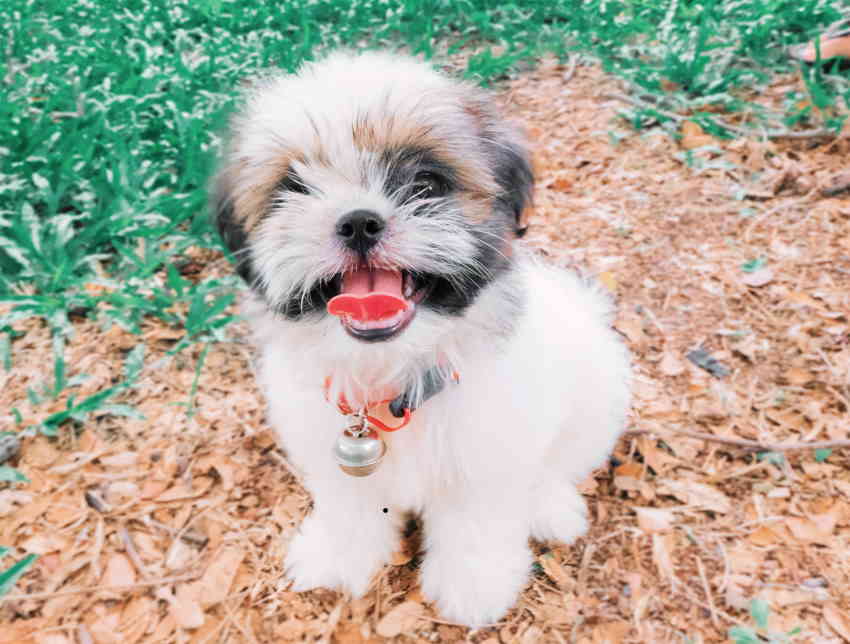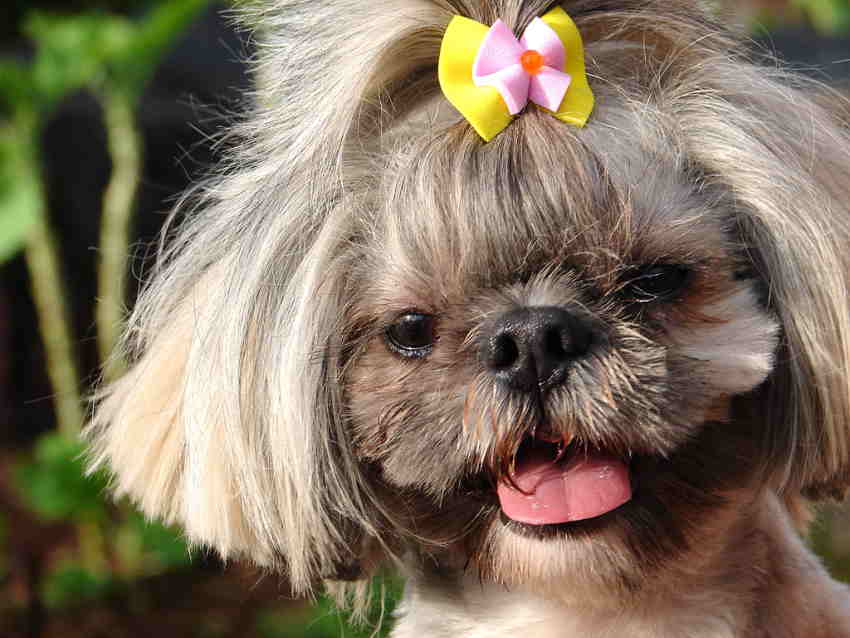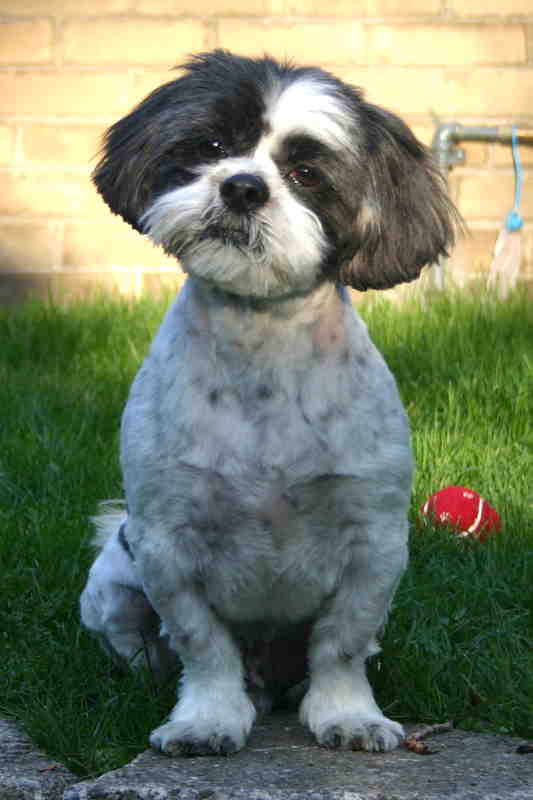Shih Tzu Puppy Teeth: Guide to Teething and Tooth Loss
WRITTEN BY STACY | EVERYTHINGSHIHTZU.COM
This post may contain affiliate links. Read privacy & disclosure policy for info
If you have a puppy, you might have already experienced the joys of finding chewed-up shoes and bite marks on your furniture. It's not that your precious pup is being mischievous; it's likely your Shih Tzu is going through the normal process of teething.

Puppies go through a teething stage, eventually losing their baby teeth (deciduous teeth) to make room for their adult teeth. During the teething phase, it's typical to find tiny puppy teeth laying about; they fall out as your pup chews on everything and anything to relieve soreness.
The adult teeth then push through the gums and take the place of the puppy teeth.
Of course, you don't have to grin and bear it as your young pup destroys everything from the ankles down. That's where handy products like a teething ring and chew toys come into play.
But first, here's a look at what you can expect when it comes to your Shih Tzu puppy losing teeth.
When Does a Shih Tzu Puppy Lose Teeth?
According to the American Kennel Club a puppy starts getting teeth around two-weeks-old (about the same time they begin to open their eyes).
Typically, puppies don't leave their mothers until at least 8 weeks, so by the time you get your furry friend, she'll likely already have all 28 of her puppy teeth.
This complete set of teeth includes the front teeth, or incisors, canine teeth, and premolars.
Around 12 weeks, Shih Tzu pups start growing their adult teeth, which means the puppy teeth need to make room.
During this period, a Shih Tzu will likely experience sore teeth and gums, which is why you'll notice he wants to gnaw on anything he can get a hold of, including your best shoes.
As your pup chews, the puppy teeth fall out, making room for the 42 brand-new adult teeth that will eventually take their place.
How Do You Know If Your Shih Tzu Is Teething?
When your puppy is around 3-months-old, don't be surprised to start finding tiny teeth scattered about and even small drops of blood.
Don't worry; it's perfectly normal.
These are just some of the many signs that your Shih Tzu is teething.
Here are a few other things to keep a lookout for:
- Drooling more than usual
- Excessive chewing
- Swollen, red gums (where the adult teeth are trying to push through; which is why your pup's mouth is so sore during the teething process, leading to all of the chewing)
- Changes in behavior (Since your pup is dealing with a sore mouth, he might get grumpy now and then, so behavior changes can signal teething)
- Crooked teeth (the result of an adult tooth pushing through before a puppy tooth falls out)
How Long Does the Shih Tzu Teething Phase Last?
You can expect your Shih Tzu puppy to go through the teething phase for about 4 to 5 months.
Most puppies stop teething around 6 months, but every dog is different. However, although not unheard of, it's unlikely your pup will teethe past 8 months of age.
The final adult teeth your puppy is likely to get are his molars.
How Can You Help Your Shih Tzu (and your belongings) During the Teething Phase?

It's essential to provide your pup with something safe to chew on while he's teething, not only to alleviate his soreness and discomfort but to protect your stuff.
Provide your dog with effective toys designed for teething puppies.
These toys are durable and give your pup something to really sink his teeth into (no pun intended).
To make the chews extra effective, place them in the freezer for a little while first. The coolness will further help ease your pal's sore teeth and gums and help with inflammation.
Avoid using rawhide chews, as they can pose choking hazards. Instead, go with something like a Nylabone or Benebone.
It's also a good idea to safeguard your belongings, just in case.
Even when you give your pup the proper tools, they will likely still go for whatever is nearby that can offer relief.
Therefore, limit your pup's access within your home during the teething phase and put anything you really don't want getting destroyed in a safe place.
You can also use products like bitter apple spray on furniture and other large pieces to encourage your pup to stay away, as dogs can't stand the smell or taste.
Keep an extra close eye on your puppy while he's teething, and utilize all the usual practices you would normally do to help dissuade a pup from mischief.
Provide ample opportunities for exercise, offer stimulating and engaging toys to keep your pal amused, and participate in early and proper training with your pup.
Shih Tzu Puppy Teeth to Adult Permanent Teeth
Puppy teeth are only temporary. In a few short months these razor sharp tiny teeth are replaced with their permanent adult teeth.
As an adult dog, the number of teeth your Shih Tzu will have increases significantly.
Those twenty-eight teeth your Shih Tzu had as a puppy, as an adult, becomes forty-two.
Here's a quick rundown of the 42 teeth your Shih Tzu will get as an adult dog, totaling 20 upper teeth and 22 lower teeth:
- 12 Incisors -- (6 on the bottom, 6 on the top) Dogs use these teeth to grab things and some chewing and grooming.
- 4 Canines -- (2 on the bottom, 2 on the top) Pups use their canines for gripping and tearing.
- 16 Premolars -- (8 on the bottom, 8 on the top) Dogs use their premolars for grinding up food.
- 10 Molars -- (6 on the bottom, 4 on the top) Shih Tzu use these teeth for grinding up and breaking food into smaller pieces, so it is more digestible.
Any puppy teeth that don’t fall out will need to be extracted by a veterinarian.
Brushing your Shih Tzu's teeth along with consistent dental exams and deep cleanings by your veterinarian will help keep your dog's adult teeth in excellent health.
What If Your Adult Shih Tzu Is Losing Teeth?

Unlike puppies, it isn't normal for adult dogs to lose teeth.
Of course, specific injuries or trauma can knock out a single tooth, as can chewing on overly hard objects. If this happens, you can call your vet for some guidance, but it likely isn't cause for alarm.
However, losing multiple teeth is more of a cause for concern.
Therefore, if your Shih Tzu is losing his adult teeth, you need to schedule an appointment with your vet. It could be periodontal disease or tooth decay.
Poor dental hygiene can also cause other major health issues, including conditions with the heart, kidneys, and liver.
So if you notice your pup is losing teeth, has loose teeth, or has increasingly bad doggy breath, these are all reasons to pay a visit to your vet as soon as possible.
Other signs of tooth problems can be not eating and changes in behavior due to pain and discomfort.
Overall, your pup's teeth play a significant role in his overall health, so it's essential to take the utmost care of them.
A healthy mouth equals and healthy and happy pup.



